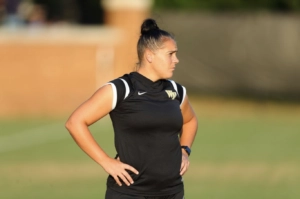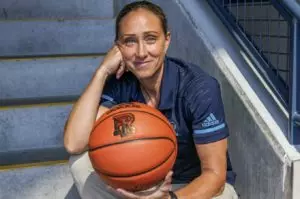Bulimia is an emotional disorder involving distortion of body image and an obsessive desire to lose weight, in which bouts of extreme overeating are followed by depression and self-induced vomiting, purging, or fasting. The disorder can be life-threatening. People with this condition binge eat and then take steps to avoid weight gain. Although purging after eating is most common, it can also mean excessive exercising or fasting.
There is significant evidence that eating disorders are prevalent in athletes. Specifically, athletes that participate in sports that are weight-sensitive such as endurance and weight category sports. Athletes are under constant pressure from their coaches, teammates and parents, but mostly themselves. They are constantly comparing themselves to their teammates and their competition.
Jaileen Goncalves just finished up playing soccer at the University of Rhode Island. She was a captain of the women's soccer team at URI for two years. She started in almost every game throughout her four years, playing in all but six games. Jaileen was a role model on and off the field; she led by example, which is a crucial quality to possess as a leader. Her commitment to the team and her consistency was bar none. Every time she stepped a foot on the field, you knew what you were going to get. Besides playing on the soccer team at URI, she was also a member of SACC and was on the dean's list every semester. Although on the outside, it may have seemed liked Jaileen had it all together, internally, she was fighting a battle with herself.
I am Jaileen Goncalves, and here is my story.
I was always that girl that could run forever. Everyone would always comment on how tiny I was and how great I looked. Then the unexpected happened, I got injured. I was no longer that small girl that people admired, at least that is what I thought. I felt as though I could not get back to the weight that I used to be. I hated myself when I looked in the mirror. One day I found myself throwing up after a meal, and before I knew it, it became my normal behavior.
I played center midfield, which requires a lot of endurance. I might have seemed happy on the outside and confident in my body, but on the inside, I struggled with my body image. During my senior year of high school, I would barely eat anything without feeling bad about myself. I was not purging at this point, but I was excessively exercising and felt the need to exercise after eating. When I came into pre-season freshman year of college, I earned the best scores on the fitness test. I received compliments from my teammates; they were telling me that I looked fit and wished they could run like me.
After my freshman year of college, I got injured, and that was when things took a turn for the worse. I was not able to exercise the way I used to, so I started to gain weight. I hated looking at myself in the mirror and was constantly comparing myself to my teammates. I was no longer the smallest or fittest player on the team. It was messing with my head; I did not know what to do. I turned to eating a mass amount of ice cream but felt so guilty afterward. Then that horrible day came when I started to purge. The purging started as an occasional thing, but then it continued even after I was cleared to play. Some thoughts that were going through my head were: “If I gain weight and can't run, the coach will be mad at me. My teammates will be disappointed in me.” Because of the stress, I continued to binge and purge. It was a vicious cycle.
When people would tell me that I looked skinny in clothing, it made me feel better about myself. I put pressure on myself because I thought if I were not skinny, I would not be able to run fast. And if I could not run fast, then maybe the coaches would not be happy with me. They were kind, but in my mind, the words got twisted. They would say, “You are the fittest on the team! If only everyone else could run as much as you can!” At that time, those words felt like pressure in my mind.
Eventually, the purging became so frequent that I could not eat a meal without feeling as though I needed to run to the bathroom or workout. I started to develop anxiety and depression. I could tell I was letting myself go, and I could barely make it through practice or a lift. I always felt weak and exhausted, but I tried to tell myself it was just because of school and soccer.
After months of battling my bulimia, I was finally able to seek help, see a doctor, a nutritionist, and get my health back on track. The recovery process consisted of talking to a therapist and maintaining a healthy relationship with food. This did not happen overnight; it took time, but eventually, I understood that in order to fuel my body I needed to eat. Today, I do not feel guilty after meals; I eat foods serving my body to give it the energy and nutrients it requires to function correctly.
A significant learning experience for me was that I should not compare myself to others. If I am striving to be the best version of myself, then that should be good enough. Even after this horrible ordeal, I'm proud to say I was able to earn the best scores on our fitness tests. While I was not that tiny girl anymore, I became comfortable in my own skin.
Eating disorders are very serious, and there is a significant number of athletes that battle with them. Recognizing them straight away and reaching out to someone for help is vital. You will need to do this before you damage your body. Some long-term effects can include cavities, gum disease, intestinal problems, hair loss, dry skin, sleep problems, strokes and organ failure.
Trust me, you do not want this.
Most colleges now have many resources readily available to their athletes who are struggling with eating disorders, whether it's a nutritionist, doctor, psychologist, or trainer. If you have an eating disorder, seek help immediately. I hope my story can help at least one person out there with this eating disorder.
* Originally published on June 15, 2020, by Jaileen Goncalves







